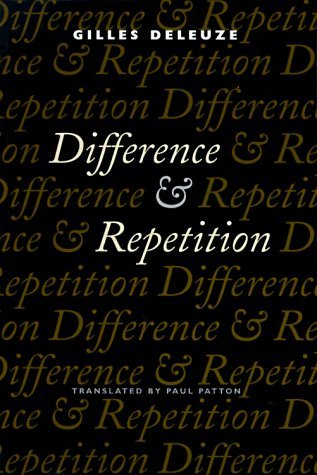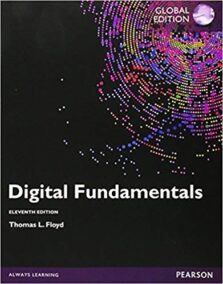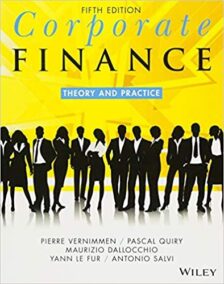Difference and Repetition by Gilles Deleuze, ISBN-13: 978-0231081597
Original price was: $50.00.$14.99Current price is: $14.99.
Difference and Repetition by Gilles Deleuze, ISBN-13: 978-0231081597
[PDF eBook eTextbook]
- Publisher: Columbia University Press; Revised ed. edition (April 15, 1995)
- Language: English
- 350 pages
- ISBN-10: 0231081596
- ISBN-13: 978-0231081597
This brilliant exposition of the critique of identity is a classic in contemporary philosophy and one of Deleuze’s most important works. Of fundamental importance to literary critics and philosophers, Difference and Repetition develops two central concepts―pure difference and complex repetition―and shows how the two concepts are related. While difference implies divergence and decentering, repetition is associated with displacement and disguising. Central in initiating the shift in French thought away from Hegel and Marx toward Nietzsche and Freud, Difference and Repetition moves deftly to establish a fundamental critique of Western metaphysics.
Table of Contents:
Translator’s Preface xi
Preface to the English Edition xv
Preface xix
INTRODUCTION: REPETITION AND DIFFERENCE 1
Repetition and generality: first distinction from the point of view of conduct — The two orders of generality: resemblance and equality — Second distinction, from the point of view of law — Repetition, law of nature and moral law — The programme of a philosophy of repetition according to Kierkegaard, Nietzsche and Péguy — True movement, theatre and representation — Repetition and generality: third distinction from the point of view of concepts — The comprehension of concepts and the phenomenon of ‘blockage’ — The three cases of ‘natural blockage’ and repetition: nominal concepts, concepts of nature and concepts of freedom — Repetition is not explained by the identity of the concept, any more than it is by a purely negative condition — The functions of the ‘death instinct’: repetition in its relation to difference and as requiring a positive principle. (The example of concepts of freedom) — The two repetitions: by means of the identity of the concept and a negative condition, and by
means of difference and excess in the Idea. (Examples of natural and nominal concepts) — The bare and the disguised in repetition — Conceptual difference and difference without concept — But the concept of difference (Idea) cannot be reduced to a conceptual difference, any more than the positive essence of repetition can be reduced to a difference without concept
CHAPTER I DIFFERENCE IN ITSELF 28
Difference and the obscure ground — Must difference be represented? The four aspects of representation (fourfold root) — The propitious moment, difference, the large and the small — Conceptual difference: the greatest and best — The logic of difference according to Aristotle, and the confusion of the concept of difference with conceptual difference — Specific and generic difference — The four aspects or the subordination of difference: identity of the concept, analogy of judgement, opposition of predicates, resemblance of the perceived — Difference and organic — The impossibility of reconciling univocity and analogy — The moments of the univocal: Duns Scotus, Spinoza, Nietzsche — Repetition in the eternal return defines the univocity of being — Difference and orgiastic representation (the infinitely large and the infinitely small) — The ground as reason — Logic and ontology of difference according to Hegel: contradiction — Logic and ontology of difference according to Leibniz: vice-diction (continuity and indiscernibles) — How orgiastic or infinite representation of difference does not escape the four aspects previously mentioned — Difference, affirmation and negation — The illusion of the negative — Eternal return and the elimination of the negative — The logic and ontology of difference according to Plato — The figures of the method
of division: claimants, the ground-test, problems-questions, (non)-being and the status of the negative — That which is crucial in the problem of difference: simulacra and the resistance of simulacra
CHAPTER II REPETITION FOR ITSELF 70
Repetition: something is changed — First synthesis of time: the living present — Habitus, passive synthesis, contraction, contemplation — The problem of habit — Second synthesis of time: the pure past — Memory, pure past and the representation of presents — The four paradoxes of the past — Repetition in habit and in memory — Material and spiritual repetition — Cartesian Cogito and Kantian Cogito — The indeterminate, determination, the determinable — The fractured I, the passive self and the empty form of time — Inadequacy of memory: the third synthesis of time — Form, order, totality and series of time — Repetition in the third synthesis: its condition by default, its agent of metamorphosis, its unconditioned character — The tragic and the comic, history, and faith from the point of view of repetition in eternal return — Repetition and the unconscious: ‘Beyond the pleasure principle’ — The first synthesis and binding: Habitus — Second synthesis: virtual objects and the past — Eros and Mnemosyne — Repetition, displacement and disguise: difference — Consequences for the nature of the unconscious: the serial, differential and questioning unconscious — Towards the third synthesis or the third ‘beyond’: the narcissistic ego, the death instinct and the empty form of time — Death instinct, opposition and material repetition — Death instinct and representation—Univocity and diference—The two types of distribution repetition in the eternal return — Resemblance and difference — What is a system? — The dark precursor and the ‘differenciator’ — The literary system — The phantasm or simulacrum and the three figures of the identical in relation to difference — The true motivation of Platonism lies in the problem of simulacra — Simulacra and repetition in eternal return
CHAPTER III THE IMAGE OF THOUGHT 129
The problem of presuppositions in philosophy — First postulate: the principle of the Cogitatio natura universalis — Second postulate: the ideal of common sense — Thought and doxa — Third postulate: the model of recognition — Ambiguity of the Kantian Critique — Fourth postulate: the element of representation — Differential theory of the faculties — The discordant functioning of the faculties: the violence and limits of each — Ambiguity of Platonism — Thinking: its genesis in thought — Fifth
postulate: the ‘negative’ of error — Problem of stupidity — Sixth postulate: the privilege of designation — Sense and proposition — The paradoxes of sense — Sense and problem — Seventh postulate: the modality of solutions — The illusion of solutions in the doctrine of truth — Ontological and epistemological importance of the category of problems — Eighth postulate: the result of knowledge — What does it mean ‘to learn’? — Recapitulation of the postulates as obstacles to a philosophy of difference and repetition
CHAPTER IV IDEAS AND THE SYNTHESIS OF DIFFERENCE 168
The Idea as a problematic instance — Indeterminate, determinable and determination: difference — The differential — Quantitability and the principle of determinability — Qualitability and the principle of reciprocal determination — Potentiality and the principle of complete determination (the serial form) — Futility of the infinitely small in differential calculus — Differential and problematic — Theory of problems: dialectic and science — Idea and multiplicity — Structures: their criteria, the types of Idea —
Procedure of vice-diction: the singular and the regular, the distinctive and the ordinary — Ideas and the differential theory of the faculties — Problem and question — Imperatives and play — Ideas and repetition — Repetition, the distinctive and the ordinary — The illusion of the negative — Difference, negation and opposition — Genesis of the negative — Ideas and virtuality — The reality of the virtual: ens omni modo … — Differentiation and differenciation; the two halves of the object — The two aspects of each half — The distinction between the virtual and the possible — The differential unconscious; the distinct-obscure — Differenciation as process of actualization of Ideas — Dynamisms or dramas — Universality of dramatization — The complex notion of different/ciation
CHAPTER V ASYMMETRICAL SYNTHESIS OF THE SENSIBLE 222
Difference and diversity — Difference and intensity — Cancellation of difference — Good sense and common sense — Difference and paradox — Intensity, quality, extension: the illusion of cancellation — Depth or the spatium — First characteristic of intensity: the unequal in itself — Role of the unequal in number — Second characteristic: affirmation of difference — The illusion of the negative — The being of the sensible — Third characteristic: implication — Difference in kind and difference of degree — Energy and eternal return — Repetition in the eternal return is neither qualitative nor extensive but intensive — Intensity and differential — Role of individuation in the actualization of Ideas — Individuation and differenciation — Individuation is intensive — Individual difference and individuating difference — ‘Perplication’, ‘implication’, ‘explication’ — Evolution of systems — Centres of envelopment — Individuating factors, I and Self — Nature and function of the other in psychic systems
CONCLUSION 262
Critique of representation — Futility of the choice between finite and infinite — Identity, resemblance, opposition and analogy: how they betray difference (the four illusions) — How they betray repetition as well — The ground as reason: its three senses — From the ground to groundlessness — Impersonal individuations and pre-individual singularities — Simulacra — Theory of Ideas and problems — The Other — The two kinds of play: their characteristics — Critique of categories — Repetition, the identical and the negative — The two repetitions — Pathology and art, stereotypes repetitions — Selective force of the third: Nietzsche and eternal return
(simulacra) — That which does not return — The three senses of the Same: ontology, illusion and error — Analogy of being and representation, univocity of being and repetition
Notes 305
Bibliography 334
Index 345
Gilles Deleuze (1925-1995) was Professor of Philosophy at the University of Paris VIII. He died in November 1995. Among his many works are The Logic of Sense, Difference and Repetition, and Nietzche and Philosophy, all published by Columbia University Press.
What makes us different?
• Instant Download
• Always Competitive Pricing
• 100% Privacy
• FREE Sample Available
• 24-7 LIVE Customer Support
















Reviews
There are no reviews yet.